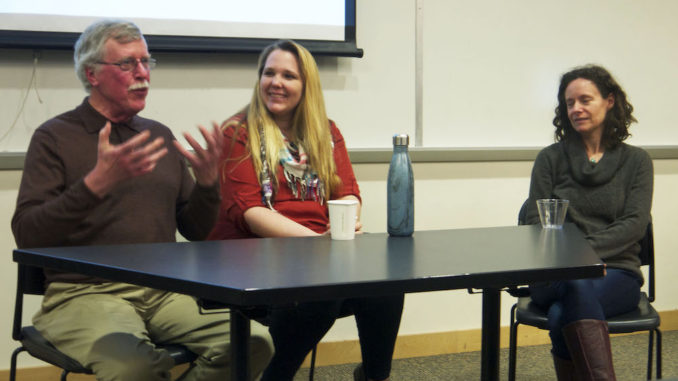
By Hanna Merzbach
The Lewis & Clark Sustainability Council held the kickoff event of its conversation series “Hot Topics” on Feb. 8. Entitled “Cultivating connectedness through community- and place-based learning,” the event brought together three speakers: College of Arts and Sciences Visiting Assistant Professor Jolina H. Ruckert, former Professor at the LC Graduate School of Education & Counseling Greg Smith and Education Coordinator at the Cottonwood School of Civics and Science Sarah Anderson.
Associate Professor of German Katharina Altpeter-Jones, a member of the LC Sustainability Council, helped organize the event.
“We have these three schools and we have specialists in all these schools, but we don’t often get to come together to talk about these things because we all live in our different schools in our departments,” Altpeter-Jones said. “We have these vibrant corners, pockets of activity … So, we just wanted to see what kind of synergy we could develop be bringing people together, people from different schools and from the Portland community.”
Ruckert, who researches the human relationship with nature and technological nature, began the conversation by invoking discussion among the students, staff and faculty in attendance. She prompted participants to think of experiences with nature that helped to foster place-based connections.
Director of Sustainability and Communications Amy Dvorak shared her experience growing up in Oregon and attending outdoor school.
“I had this one particular teacher who was so passionate about birds and he really went out of his way to share his knowledge and impart some of his knowledge in our class,” Dvorak said.
Ruckert elaborated on the relationship between strong mentorships and place-based education.
“The little bit of research we have trying to connect early life experiences and later environmentalism and sustainability concerns,” Ruckert said. “What they often find is this thread of meaningful mentors and meaningful experiences with mentors, having the mentors share with (students) and bring that enthusiasm and say ‘notice this’ and ‘notice that.”
Smith followed Ruckert, giving a presentation showing examples of place-based education that strive to provide students with opportunities to make connections like the ones Ruckert discussed.
Smith drew from his knowledge researching place-based education and from sitting on the board of many alternative schools.
He sees place-based education as being essential in maximizing sustainability.
“To create a sustainable society, from an educational standpoint, we really need to nurture citizens to understand the nature of our current situation, feel connected enough to their places and communities to want to get involved, have the capacity to analyze it and then solve problems and possess the competence to take action,” Smith said.
Smith said schools should be a place where they can learn how to be citizens and environmental activists. He helped establish the Portland Environmental School (now Sunnyside Environmental School) in 1995. Every week, while Smith worked there, students spent at least one day out of the classroom doing fieldwork.
“One of the things that characterized the school curriculum was that there really was an effort to link it to our own natural environment in Oregon,” Smith said. “So, one year the entire curriculum would focus on mountains. The next year it would focus on rivers and the next year it would focus on forest and it would just alternate.”
At Sunnyside today, students are encouraged to use Portland’s resources, whether that be using Mount Tabor to study volcanic matter or using the TriMet transport system to minimize carbon emissions. After studying Portland, the students are encouraged to apply their knowledge on a global scale.
“As educators, it is important to not just give students one point of view but explore those multiple points of view and then let the students come up with their own decisions,” Smith said.
As an Education Coordinator at the Cottonwood School of Civics and Science in Portland, Anderson, the third and final speaker, echoed much of what Smith said.
“Place-based education redefines what the word environment means when we talk about environmental education,” Anderson said. “It’s not just nature education. We are talking about all of the different elements of an environment, the nature world but also the built world.”
As she was the only speaker to have never worked at LC, Anderson brought in a unique community perspective.
“Community building is really central to place-based education,” Anderson said. “We talk a lot about taking down the wall between the school and the rest of the community so that school is not a place that kids just go for 12-plus years and come out and are able to engage in the world. They are actually acting as citizens while they are in the school.”
Anderson made a distinction between “fieldwork” and “field trips.”
“Fieldwork is part of how the students do the work,” Anderson said. “That’s how they’re collecting the data. That’s how they are doing the surveys. That’s how they are getting to know the things that they need to know.”
As experts in the place-based learning, the speakers understood the difficulties in using this learning method, however, felt its value outweighed its costs.
“To really do this well, you have got to trust kids,” Smith said. “You have to be willing to kind of relinquish some of the control. Much of what happens in regular schools is predicated on control and distrust, but when you begin actually trusting the kids, it is amazing what they can do and how satisfying it can be.”
The Hot Topics conversation series will continue throughout February and March, bringing in speakers from all three schools along with community members. See the LC Sustainability website for specific times and dates.
Subscribe to the Mossy Log Newsletter
Stay up to date with the goings-on at Lewis & Clark! Get the top stories or your favorite section delivered to your inbox whenever we release a new issue.

Leave a Reply